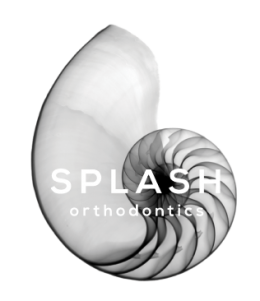Gum recession happens when the gums surrounding your teeth recede, exposing more of the tooth or even the tooth’s root.
Some gum recession as we get older is normal. It usually happens very gradually, so you may not even notice your gums receding.
If your gum recession is more sudden or extensive, you should make an appointment to see your dentist. They’ll determine the cause of your recession and, if necessary, refer you to a periodontist (gum specialist) for treatment.
Left untreated, severe gum recession can affect the supporting tissues and bone structure, eventually leading to tooth loss.
Can braces help gum recession?
Unfortunately, braces and Invisalign aligners can’t cure or reverse gum recession. Sometimes, though, they can offer a small cosmetic improvement. For example, if a prominent tooth has some recession, bringing it back into line can improve its appearance.
What braces can do is prevent gum recession for some patients:
- Gum disease is a major cause of gum recession, and poor oral health is a large contributing factor. Straight teeth make it easier for you to reach all the surfaces of your teeth to keep them clean and healthy.
- Sometimes a bad bite, for example, a deep overbite, can result in recession, so by repositing your teeth, we can avoid further damage to your gums.
IPR and gum recession
If your gums have receded, you may be aware of small gaps between your teeth and gumline. If you don’t like the look of these dark triangles, there’s a technique we can use to minimise their appearance.
Interproximal reduction (IPR) reduces the width of your teeth by removing tiny amounts of enamel. As well as diminishing dark triangles, it can create extra space to help us align your teeth perfectly. It’s quick and painless and very safe when it’s carried out correctly.
Can braces cause gum recession?
In the same way that braces can improve the appearance of gum recession, they can also make it more apparent.
Braces alone won’t cause gum recession. However, how well you look after your teeth during orthodontic treatment will have an impact.
You’ll need to clean carefully around your braces and along your gumline to brush away plaque every day. Plaque is a sticky, colourless film that accumulates on our teeth. It contains millions of bacteria, and if it’s not removed it can cause tooth decay and gum disease.
We recommend brushing your teeth for four minutes three times a day while wearing braces. Brushing too enthusiastically can also contribute to receding gums, so be gentle but thorough.
Can I have braces if my gums have receded?
During your free consultation, our specialist orthodontist Dr Iain Hoeltschi will carefully examine your teeth and gums.
Gum recession is very common, particularly around the lower front teeth. If your gums are healthy, you’ll most likely be suitable for braces.
During your treatment, we’ll monitor your gumline closely. We can reduce the risk of further recession by moving your teeth slowly and gently.
Unfortunately, we can’t guarantee that your recession won’t get worse. If this happens, we can refer you to a specialist periodontist.
If you have any active gum disease, this will need to be treated before we fit your braces.
Tips for preventing gum recession
- Brush gently – don’t scrub your teeth and gums
- Stop smoking – smokers have a higher risk of gum disease
- See your dentist for regular check-ups – especially during orthodontic treatment
- Avoid clenching or grinding your teeth – your dentist can recommend a mouthguard
- Avoid mouth piercings – they can irritate your gums and cause recession
To find out if orthodontic treatment is right for you, arrange a complimentary consultation with our friendly team in Hove.

 Hove
Hove 01273 203514
01273 203514



 Read more
Read more

